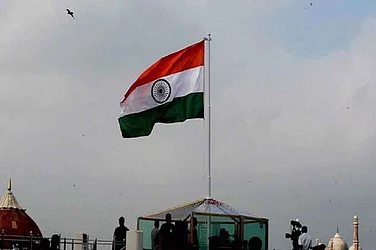The Vindhyas, as the legend goes, grew so high that the mountains once obstructed the path of the sun. Sage Agastya, travelling to the south, is believed to have asked the mountains to lower themselves to facilitate his passage. The Vindhyas obliged in reverence. This is a story that BJP leaders love to narrate with the belief that Prime Minister Narendra Modi is their best bet to emulate the seer and help the party breach the political Vindhyas. But the region that is collectively referred to as south India has proved to be an invincible fortress for the all-conquering saffron army led by Modi. Barring a foothold in Karnataka, the BJP has yet to find the winning formula for the five southern states. And it’s a reality the BJP may have to live with after this summer’s general elections.
The south—Tamil Nadu, Andhra Pradesh, Telangana, Kerala, Karnataka and Union territory Pondicherry—account for 130 Lok Sabha seats, nearly a quarter of the total of 545. For any party claiming to represent the nation, it is a huge chunk to ignore. In the 2014 Lok Sabha elections, the BJP had won 21 of them, 17 in Karnataka alone. And it has been looking to double its tally on its own. It is also working at getting allies among the regional parties. But ground reality presents a different picture and the BJP’s target of getting at least 80 seats in the NDA kitty looks difficult with each passing day. It appears more difficult after the BJP lost one of its biggest allies, the Telugu Desam Party (TDP), in Andhra Pradesh.
But that has not stopped the BJP from launching its big guns for this battle for the last frontier. It could be now of never for the party, which had swept the 2014 polls but appears much less confident. Party’s sharpshooter, Union minister Piyush Goyal, has been made election in-charge for Tamil Nadu that sends 39 members to Lok Sabha. Party sources say that the instructions to him are clear—try and build alliances with regional parties to broaden the NDA’s base. Goyal is likely to meet Tamil Nadu chief minister E.K. Palaniswami soon after he presents the budget on February 1, to try and forge an alliance with the AIADMK (see ‘Hazy Saffron in Dravida Naadu’).
RSS man Sunil Deodhar has been made co-in-charge of Andhra Pradesh. Widely known to be the architect of BJP’s historic win in Tripura, Deodhar has been tasked with strengthening the party and expanding its network, in addition to keeping options open on alliances. Deodhar tells Outlook that the BJP’s doors are open but any alliance is likely to happen only post-poll. “There is no signal yet from either Jaganmohan Reddy (YSR Congress Party) or Pawan Kalyan (Jana Sena Party),” he says (see ‘The Telugu Trenches’).
The same seems to be the case in other states. A senior BJP leader admits that a pre-poll alliance in any southern state seems unlikely, and BJP is not in a position to make any gains on its own. “Everything is in a flux as of now. We may get support post-poll from YSRCP, TRS or AIADMK but a pre-poll alliance appears difficult owing to their own compulsions,” he says.
BJP president Amit Shah, known for winning election strategies, realised soon after the 2014 election sweep that it could be difficult to repeat the performance in 2019. The party had already peaked in the Hindi heartland and established firm hold over western states of Gujarat and Maharashtra. To make up for the loss in the states owing to factors like anti-incumbency, Shah launched the so-called ‘Coromandel Plan’, focusing on the coastal states. The plan includes West Bengal and Odisha. Shah also chose to pay attention to northeastern states, where the party has seen substantial electoral gains. The same cannot be said for the eastern states of West Bengal and Odisha—accounting for 63 seats—and the south.
With the recent assembly results showing the BJP losing its stranglehold over the Hindi heartland, the fight for east and south has become more intense. The BJP—predominantly seen as pushing the Hindi, Hindu, Hindustan agenda—is, however, facing tough resistance from the southern states that feel threatened from the “North Indian onslaught”. Not to be deterred by the less than lukewarm response it is getting, the ruling party at the Centre has not given up. With Lok Sabha polls scheduled around 10 weeks from now, the BJP has unleashed all the weapons from its arsenal to expand its electoral footprint in peninsular India.
PM Modi visited Tamil Nadu and Kerala over the weekend, kick-starting the BJP campaign for the general elections. It was his second visit to Kerala this year. He is scheduled to hold two rallies in West Bengal in the first week of February. BJP sources claim that the party plans to hold at least 300 rallies in the southern states, and a similar number in the east, in the run-up to the April-May polls.
BJP general secretary and Tamil Nadu in-charge Muralidhar Rao believes that once PM Modi begins campaigning, it will give a major boost to the BJP’s growth plan in the state and south India. Development projects of the Centre will remain the focus. “No other government has done so much work in the state in a short span of time,” he says.

BJP chief Amit Shah wears a Mysore peta at a campaign rally in Karnataka
As expected, Modi spoke about 89,000-odd people in Tamil Nadu benefiting from Ayushman Bharat—the Centre’s health insurance scheme, dubbed ‘Modicare’—as he laid the foundation stone for an All India Institute of Medical Sciences (AIIMS) in Madurai. In Kerala, while he spoke of development, it became apparent that the party plans to keep the emotive Sabarimala issue on the boil. The subliminal message continued to be Sabarimala as he slammed the LDF government over allowing the entry of women under the age of 50 into the temple (see ‘Temple Reloaded’).
In no mood no mince words, the PM charged, “The conduct of (the) Kerala government on (the) Sabarimala issue will go down in history as one of the most shameful acts by any party or government. We knew that Communists don’t respect Indian history, culture and spirituality. But no one imagined they would have such hatred for our culture and civilisation that have stood the test of time over centuries.”
A senior BJP leader tells Outlook that the party hopes to reap benefit from the Sabarimala movement—being spearheaded by the RSS—not only in Kerala but also in other southern states. “Lord Ayyappa is to the south what Lord Rama is to the Hindi heartland for the BJP. There are a large number of Lord Ayyappa devotees in Tamil Nadu, Andhra Pradesh and Karnataka too. The plan is to organise them, down to the booth level, before the elections,” the BJP leader reveals.
According to him, the devotees of the celibate god cut across caste, class and political affiliation. It is worthwhile for the BJP to try and win them over to its side. The party is reaching out to ‘guru swamys’, senior devotees, who can influence the others. However, a BJP leader from the south believes that the religion card may not work in the region. “In Tamil Nadu, for instance, the BJP cannot use Hindutva to persuade Hindu Tamils to embrace the party and its concept of Hindu nationalism. This strategy worked in UP to an extent where the BJP managed to stitch together a rainbow coalition, polarising the Hindu votes cutting across caste and economic background. It cannot work in the south, simply because other markers like language and culture are more important for the people here. They are not going to abandon them for the homogeneity of a Hindu identity,” the leader explains.
Unfortunately, he says, national parties like the BJP and even the Congress have failed to communicate with the people of the region in their idiom. “South Indian states are not like Jammu and Kashmir or the Northeast. These are highly politicised states where regional politics has taken deep roots. The BJP has failed to nurture any local leadership and it is going to be a long fight for the BJP to occupy mind space of the people here. The BJP is still seen as Hindi party whose intention is subordination of the south. Tarun Vijay’s remark on ‘black’ south Indian people still rankles, and they are convinced that it reflects the general mindset of the north Indian party,” he adds. (See Where Necessity Beats Possibility)
According to him, people of southern states are as politically shrewd. “They are politically aware. The media penetration is much higher than anywhere else in the country. Each district has its own newspaper. The distrust for national parties is deep-rooted,” he says. Having spent a considerable time in the region, the leader also makes another revelation that might startle the political parties in the north—the south Indian regional parties are not only nimble-footed and vibrant, they are heavily cash-rich too. “Their loyalty cannot be bought. A candidate for municipal elections easily spends a crore in the south,” he says. Sanjay Kumar of the Centre for Study of Developing Societies says the BJP will increase its vote share in all the southern states but this is unlikely to translate into more seats. “…Their support base is not enough to convert to seats.”
The problem is that the BJP spent the past five years in trying to make inroads into south on its own and neglected to make or nurture alliances. In Tamil Nadu, it fought as part of a rainbow alliance with parties like MDMK, PMK and DMDK and managed to garner 19 per cent votes and three seats—one of them being its own. However, the BJP failed to build on it and did not get even a single seat in the assembly elections in 2016 with the vote share falling to less than three per cent.
“The BJP seems to have lost the opportunity to present itself as a potential alternative by deploying tactics of polarisation and intimidation to expand its political base. While PM Modi may be party’s best bet to surmount the Vindhyas, it’s just that in his case, he may have to be more accommodating to create alliances and making them work,” says a party general secretary.
***
Coast to Coast: Issues that could hurt BJP

Religious/Social
- Religious polarisation over Sabarimala may not benefit BJP as much as it had hoped
- BJP’s key Hindutva plank of beef and ban on cow slaughter unlikely to work in Kerala where cow meat is a staple
- Kerala also irked over Modi comparing the state with Somalia
- Growing anger over alleged attempts to impose Hindi, a sensitive issue in the southern states
- Fears of being subsumed by culture/language of north India

Economic
- All states demanding greater fiscal autonomy
- Want bigger share of central taxes; say they are subsidising ‘poor’ north Indian states
- Kerala says 15th Finance Commission pose threat to federal structure as it cut tax devolution
- Southern states unhappy over 15th Finance Commission using population base year as 2011 instead of 1971 to allocate funds

Political
- Except Karnataka, BJP has little clout in other states; depends heavily on regional parties
- Andhra Pradesh miffed over denial of special category state status after creation of Telangana
- Unresolved Cauvery issue could dent BJP’s prospects in Tamil Nadu and to an extent in Karnataka
- Widespread anger in TN and Kerala over alleged discrimination by Modi govt in releasing funds after Cyclone Gaja and floods, respectively


























